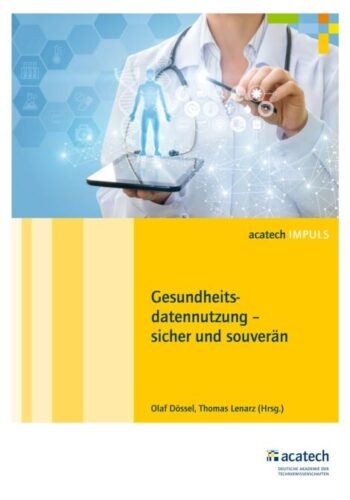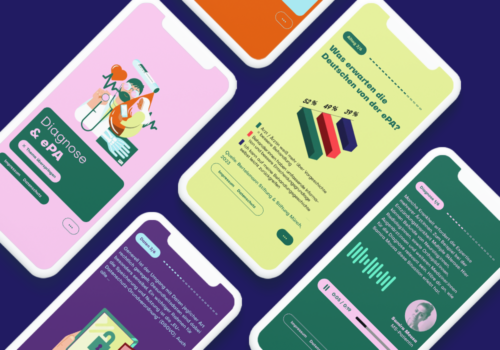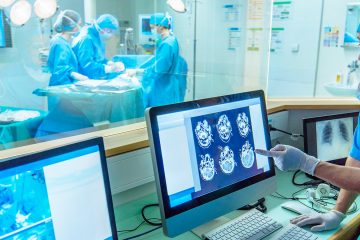The risks of non-use must be considered: acatech IMPULSE identifies need for action in the use of digital health data

Munich, 07 June 2023
acatech IMPULSE Health Data
 Medicine in Germany will not reach its full potential unless it makes adequate use of data. The IMPULSE “Gesundheitsdatennutzung – sicher und souverän” (Safe and sovereign use of health data) (in German), published today, outlines how to rectify this. In addition to proposing national rules, nuanced data sharing and ways to increase data quality, the working group is urging public debate. In its view, the risks of non-use are serious, considering the obvious benefit of health data.
Medicine in Germany will not reach its full potential unless it makes adequate use of data. The IMPULSE “Gesundheitsdatennutzung – sicher und souverän” (Safe and sovereign use of health data) (in German), published today, outlines how to rectify this. In addition to proposing national rules, nuanced data sharing and ways to increase data quality, the working group is urging public debate. In its view, the risks of non-use are serious, considering the obvious benefit of health data.
Printers are still clattering, fax machines beeping and patient files are piled up in practices and hospitals the length and breadth of Germany.
To this day, medical information that is already stored somewhere digitally frequently has to be printed out and handed to the next practitioner, where the information then has to be entered into a computer system by qualified staff,” writes Olaf Dössel in the introduction to the acatech IMPULSE. He is Professor of Biomedical Engineering at KIT (Karlsruhe Institute of Technology) in Karlsruhe and is deputy head of the acatech Healthcare Technologies topic network together with Professor Thomas Lenarz (Department Chairman at Hannover Medical School).
Paper-based data sharing not only takes time that would be better spent on patient care. “The advantages of using digital health data in medicine are now so obvious that it would be negligent not to use them,” said Thomas Lenarz. They include:
- Digital health data make individual therapies a better fit, more proactive, and more holistic. The healthcare system can be geared towards prevention rather than the treatment of symptoms.
- Multiple examinations or unnecessary treatments are avoided if doctors get the full picture that includes all of the patient’s health data.
- The use of digital health data make it possible to control pandemics more effectively; the coronavirus pandemic exposed serious weaknesses in this regard in particular, because there was a delay in obtaining important data or, in some cases, the data were inaccurate.
- Digital data sharing leads to greater efficiency and thus less unnecessary costs as well as more time for patients.
Fundamental changes in healthcare are required so that data can be used effectively for the benefit of healthcare delivery. The working group has come up with proposals on how good-quality data can be collected, shared and used. In addition, the group also believes that change is needed in relation to education and training, funding for innovation and the formation of public opinion.
Moving away from all-or-nothing opt-in/opt-out models
The acatech IMPULSE proposes a nuanced model that assumes patient sovereignty. Under this model, patients are able to decide simply and clearly with whom they share their data and for what purpose. The proposed regulation to set up a European Health Data Space should therefore include a nuanced solution for data sharing.
In particular, we must greatly improve the current situation in Germany with regard to data sharing for use in research. All-or-nothing opt-in or opt-out models fall short.
Olaf Dössel, Professor of Biomedical Engineering at KIT (Karlsruhe Institute of Technology) and deputy head of the acatech Healthcare Technologies topic network
Europe is a world leader in relation to data protection regulation, stated the working group in their IMPULSE. The EU General Data Protection Regulation (GDPR) aligns data availability with the aim of better healthcare delivery and supporting individuals to take control over their own data. However, fragmentary interpretation in the German states is hampering new developments. The federal government should therefore standardise the interpretation of the GDPR as part of the law on the use of health data. This is the only way to create legal certainty and a clear framework.
Public debate on digital health data often revolves around the risks and the definition of who is permitted to use the data. The acatech working group is not denying the risks – for example, the threat of hacking and the risk of re-identification – but it does want to focus on the purpose of use. “The question of how and for what purpose my data are used are much more important factors in my decision on what health data I share. If it’s for research, then research companies require access,” said Thomas Lenarz. “They finance much of the medical research and development; they go through the elaborate process of getting new medications and innovative medical devices approved and they are essential when it comes to ensuring that new medical discoveries filter down to the people.”
Digital guide to the electronic patient health record (ePA)

The ePA asks citizens whether and with whom they want to share their personal and sensitive digital health data. To give people the capacity to make these decisions in an informed and considered fashion, acatech and Körber-Stiftung have developed the ePA Check-up. More info (in German)
The quality of data must be right
The acatech working group proposes clear standards for the digital documentation that should mandatorily be defined within the European Health Data Space Regulation. One good option it proposes is the introduction of the FHIR standard (Fast Healthcare Interoperability Resources) across the board, which is already widely used in the US and in Israel.
“Completely unstructured data or PDF data are no use either for medical care or for research,” warned Olaf Dössel. The quality of the data determines their value for healthcare.
Preventive medicine is facilitated
While many small details are hampering data-based healthcare delivery today, in many areas a new kind of medicine is only possible with digital data. Hermann Requardt, member of the acatech Executive Board and member of the working group on health data, said, “Our healthcare system is primarily focused on the treatment of illness at the moment. This model lags behind both medical and demographic developments. For example, the treatment of back problems is complex, and may culminate in surgery. Prevention would be much better.”
Chronic illness, such as back pain, cancer, cardiovascular disorders, disorders of the sensory systems or dementia are complex pathologies. They are becoming easier to diagnose, the histories span decades and targeted prevention can have an impact.
Only personalised treatment promises real chances of prevention and cure – and this is possible once health data can be linked. We will then achieve a new level of evidence-based medicine. Our overall system of healthcare delivery must prepare for this: it must gear incentives and payment systems much more towards maintaining health and quality of life.
Hermann Requardt, member of the acatech Executive Board and member of the working group on health data



